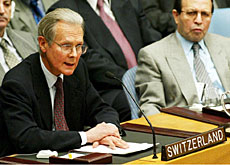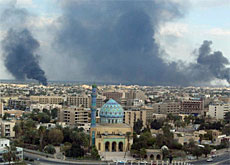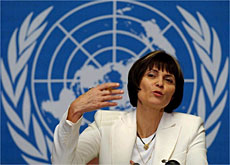Swiss ambassador says UN still has future

Switzerland's ambassador to the United Nations has been setting out his vision for the future of the UN, which has been engulfed in crisis over the United States decision to wage war on Iraq.
swissinfo’s Imogen Foulkes talked to Jenö Staehelin after his speech.
During a talk at the University of Zurich, which was provocatively entitled ‘After the conflict in Iraq, do we need the United Nations?’ Staehelin presented a pragmatic view of the UN.
His vision was one in which the rest of the world accepted the United States’ position as the only superpower.
swissinfo: Do we still need the United Nations?
Jenö Staehelin: Oh yes I’m convinced we need the UN.
swissinfo: But it’s a very changed UN isn’t it?
JS: I think the world has changed, and because the world has changed, the United Nations has changed.
swissinfo: How can the UN work though, in a situation where the United States goes to the UN, doesn’t get the decision it wants, and then carries on with its plans anyway?
JS: Well you know in fact that is based on what the UN Charter says. The Charter says that decisions can only be taken when all five permanent members of the security council agree, so in fact what has happened in the case of Iraq was not so much a failure of the UN, but, I think it was a failure of the permanent members [of the security council].
But we have had such situations before, we had a crisis of the UN during the Suez crisis [in the 1950’s] or the Congo Katanga war [in the 1960’s].
swissinfo: You have said your vision of the future of the UN is one of pragmatism, realism and acceptance. What do you mean by that?
JS: Well what I think should happen, and hopefully will happen, is that we try to manage the unipolarity, based on accepting first the fact that there is only one superpower, which is the United States.
But secondly that even a superpower cannot do it alone – or perhaps can do it alone when it comes to military power, but when it comes to fighting terrorism or fighting drugs, even a superpower has to rely on the support and help of other countries, and perhaps even the weakest countries.
Just think of terrorism; where do terrorists find a place to hide? It is sometimes the very weak and small countries, and therefore even the US needs the support of such countries.
swissinfo: And do you see Switzerland’s role in all this?
JS: Well I think we should just try to work first towards accepting this reality [of a unipolar world].
September 11th, the attack on the United States, traumatised the US to a much greater extent than we here in Europe sometimes realise.
And at the same time we have to try to convince countries like the US that working with others is in their long-term interests.
The US has a history of supporting international cooperation. For many, many years, for the last 60 years, it has been very successful in doing that, so why now stop a policy which in fact has been very successful?
It has helped us to avoid world wars, it has helped the US to win the cold war, so why now stop?
swissinfo: But the United Nations really reached a low point at the start of this year. Have things improved now?
JS: Oh yes, you know people realise that we have to work together, we have to cooperate.
And these are professionals, so this is the basis for a cooperation which in fact is not too bad.
swissinfo, Imogen Foulkes
Jenö Staehelin, the Swiss ambassador to the United Nations, has been setting out his vision for the future for a post-Iraq UN.
He gave his account during a talk at the University of Zurich, entitled ‘After the conflict in Iraq, do we need the United Nations?’
Staehelin presented a pragmatic view of the UN in which the rest of the world accepted the United States as the only superpower.

In compliance with the JTI standards
More: SWI swissinfo.ch certified by the Journalism Trust Initiative



You can find an overview of ongoing debates with our journalists here. Please join us!
If you want to start a conversation about a topic raised in this article or want to report factual errors, email us at english@swissinfo.ch.